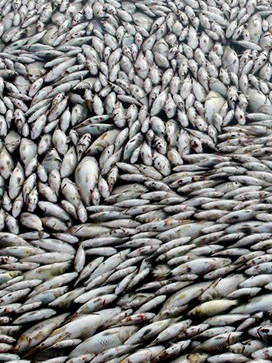Menindee fishkill explained
 Millions of dead fish have blanketed a river near Menindee in NSW.
Millions of dead fish have blanketed a river near Menindee in NSW.
Residents have observed a sea of dead fish - mostly bony bream, but also Murray cod, golden perch, silver perch and carp - spread across the surface of the water in the lower Darling-Baaka river near Menindee.
It joins several previous large-scale fish deaths that some say show there are issues with the management of water levels in the Murray-Darling Basin.
Locals have described the scale of the most recent mass kill as “unfathomable”.
The NSW Department of Primary Industries says it is aware of the mass death event.
“Significant volumes of fish including carp and bony herring, nutrients and organic matter from the floodplain are being concentrated back into the river channel. The current hot weather in the region is also exacerbating hypoxia, as warmer water holds less oxygen than cold water and fish have higher oxygen needs at warmer temperatures,” a spokesperson said.
“This event is ongoing as a heatwave across western NSW continues to put further stress on a system that has experienced extreme conditions from wide-scale flooding.”
State authority WaterNSW says it is a distressing but naturally-occurring event that often occurs after large scale flooding, as has also been the case in flood zones elsewhere in the state.
WaterNSW has been part of a government working group monitoring the floodwaters and alerting Barwon-Darling communities to the risk of fishkill.
The groups says that the absence of dams or other major assets along the length of the upper Barwon-Darling means there are few measures that can be taken to prevent fishkills caused by uncontrollable floodwaters making their way into the lakes.
As part of the multi-agency response, WaterNSW says its priority is making the best water available for the Menindee community and the environment of the lakes and Lower Darling.
Associate Prof Joy Becker, from the University of Sydney’s School of Life and Environmental Sciences, has called for an investigation to determine the cause of the deaths.
“Ultimately, fish kill events happen because the quality of the environment cannot sustain fish life,” she told reporters.
“It is important to remember that fish kill events impact not only the large-body fish like the Murray cod and bony bream, but also the small-body fish like the gudgeons that are essential to maintaining a healthy aquatic ecosystem.”







 Print
Print